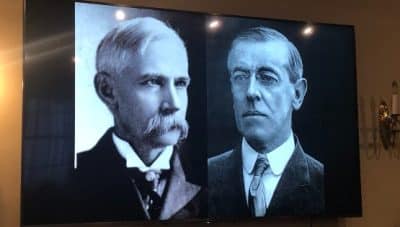Story by Chris Graham
Republican Party leaders wanted to make it look like they were extending an olive branch out to Sen. Emmett Hanger after what was an ugly primary battle between the incumbent and the man that they backed for the 24th Senate District GOP nomination, Scott Sayre.
It didn’t take much, though, to see that what they were pushing as conciliation was anything but.
“Emmett made a mistake voting to raise our taxes, and I think at this point he will not do it again,” Augusta County Republican Committee chair Kurt Michael told The News Leader on Primary Night.
The idea there is that Hanger will feel chastened by the near-miss in Tuesday’s primary and change his political tune accordingly.
For the record, Hanger doesn’t feel anything close to chastened after beating back Sayre’s challenge.
“I’m surprised that he would say that. I’ll have to give him a call to make sure that he understands that I campaigned trying to set the record straight that tax reform, as I had proposed it, and it was enacted, was good for our area,” Hanger said in an interview for today’s “New Dominion” Internet radio show.
Sayre focused his campaign effort on the tax issue – specifically a vote in 2004 for a tax-reform package that resulted in annual tax increases of $700 million a year. Hanger was one of the architects of the effort – the goal being to put less of an emphasis on food and real-estate taxes at the expense of modifications to existing sales taxes and taxes on the purchae of cigarettes.
Reforms are nuanced and thus can be hard to sell to voters in 30-second soundbites – while critics of reforms like the tax reform of 2004 can much more easily condense their thoughts and feelings into bullet points for mass consumption, as Sayre was able to do quite effectively in a TV and radio blitz that Hanger said had him worried on Primary Day.
“You go back about two weeks ago, and it looked like from our campaign plan and our polling, we were very well-positioned, and their money seemed to be drying up over there, because they were spending it, it seemed, as they got it. What happened, of course, is that there was an individual who advanced, I think, $100,000 over the last week and a half, and they were able to put that money to use to just basically lambast me – through the radio, TV and printed advertisements,” said Hanger, referencing contributions from businessman Walter Curt and his Harrisonburg-based Power Monitors Inc. that gave the Sayre campaign a much-needed infusion of cash that fueled extensive media buys in the stretch run of the primary campaign.
“That paid a price – in fact, yesterday, I guess for the first time when I was out on the campaign trail, and was witnessing firsthand some of the feedback on that advertising barrage, that it really occurred to me that it could have taken enough of my base away that I could actually lose yesterday,” Hanger said.
Having stared defeat down, Hanger could be excused for deciding that he has seen the light on tax reform and reversing his position midstream – in fact, it’s not just party leaders like Michael who assume that Hanger will go that route.
“Hanger has been very clearly sent the message. You do not go outside the bounds of appropriate Republican behavior. If you do, you will be punished. And your punishment could indeed go so far as you could lose your seat – the ultimate punishment,” Bridgewater College political-science professor David McQuilkin said.
“The party leadership has been very clear – and they are very obviously sending Hanger that message, so that when you come back to the Senate in 2008, you just had better be aware of what the party line is, and hew to it,” McQuilkin said.
“My suspicion is that if he were to continue to go outside the lines of what the party is willing to bear, he will be thoroughly challenged again – and the next time, he might not be quite so fortunate,” McQuilkin said.
Hanger is aware of that possibility – but he makes it clear that he feels that Tuesday’s vote was an endorsement of his position on taxes and spending.
“To suggest that I made a mistake, and that I’ll never do it again, is just a bit off-target. The reality of where we are right now is that I don’t view it as a mistake – I view it as sound judgment, good fiscal policy. And for our area, it actually was very sound fiscal policy that helped us significantly,” Hanger said.
“Certainly I was not sorry for my vote – because that was a very good vote, and I was actually part of the leadership putting that together,” Hanger said.










